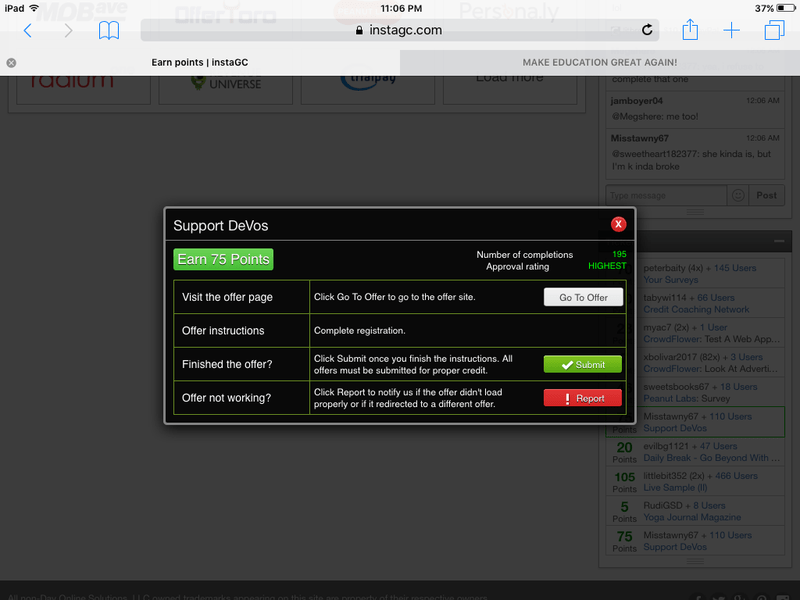Someone out there really wants President Donald Trump’s polarizing nominee for secretary of education, Betsy DeVos, to get the job — so much so that they’ve been paying random internet users to write notes supporting her contentious confirmation.
Users on paid task sites like InstaGC, Swagbucks, and Covet Fashion, which reward users for shopping at certain websites or completing small tasks and surveys online, have been reporting a task that links to SupportDeVos.com. The website contains a contact form to get in touch with members of Congress — but only to send notes of support for DeVos’s confirmation. Users who fill out and send the support form earn points or actual cash, but there is no option to send a note of dissent.
Spokespersons for InstaGC as well as the company that runs Covet Fashion each confirmed that the ads recently appeared on their sites and have since been removed.
The ads attempted to convince users they were paid for by the American Federation for Children, an organization funded and previously chaired by DeVos. But they weren’t. Spokespersons for DeVos and AFC confirmed to Vox that neither she nor the AFC had purchased the ads. Spokespersons for InstaGC and Covet Fashion each confirmed to Vox that the ads were paid for by advertisers using third-party vendors.
Recently, reports of the tasks appearing on various paid task and survey sites have been surfacing across the internet. On January 23, a Daily Kos user reported a task to support DeVos appearing on the website Swagbucks, where users could fill out the support contact form and earn “swagbucks,” or points that can be converted into cash or shopping discounts. On February 2, a Reddit user corroborated the existence of such a task on Swagbucks, while different Reddit user reported seeing a similar task on the task website InstaGC.
/cdn0.vox-cdn.com/uploads/chorus_asset/file/7926091/devos_instagc.png)
Covet Fashion is a website similar to Swagbucks which allows points to be gained for tasks and converted into or purchased for cash. Covet Fashion user Alison McCollum told Vox that she was using the site on February 2 when she ran across a task offering a significantly high-point task for notes of support sent through the SupportDeVos website.
/cdn0.vox-cdn.com/uploads/chorus_asset/file/7926003/devos_covet.jpg)
“When I clicked on the offer, it did not give an option for picking [whether] to support or not,” McCollum said. It “simply asked for name, address, email, and zip code, then had a standard support email that they would send on your behalf to your representative.”
A Swagbucks user who wished to remain anonymous also provided Vox with a screencap of the website time-stamped February 2. Visible is a task showing 26 “swagbucks,” a relatively high task amount, to send a note of support for DeVos.
/cdn0.vox-cdn.com/uploads/chorus_asset/file/7926057/devos_sb_copy.png)
Users of the paid task sites expressed serious reservations about the ethics of the tasks, with some wondering whether paid crowdfunded lobbying of this nature constitutes fraud.
The tasks give the appearance of DeVos trying to pay for support of her own nomination. The SupportDeVos website states that it is paid for by the American Federation for Children (AFC), a nonprofit educational organization that DeVos chaired until late November, when she stepped down, according to an AFC press release, in order to pursue her nomination.
Despite appearances, however, a media consultant for AFC told Vox that the organization had not purchased the ads, and that the culprit was most likely a “bad actor” or “third-party marketer who’s hijacked a platform.”
Representatives of Swagbucks could not be reached for comment. An InstaGC representative confirmed to Vox that paid tasks like these are “sometimes added automatically from advertisers we use,” and linked to a Facebook statement in which the company promises to quickly screen and remove similar ads in the future. The company also stated that it has “requested any incentive InstaGC was to receive for this promotion not be paid to us.”
In an emailed statement, a spokesperson for Glu Mobile, which runs Covet Fashion, also confirmed the third-party theory and informed Vox that the task to support DeVos had been removed. The statement also noted that the developer was in the process of reviewing its vendors to remove any politically motivated ads:
We understand that a recent offer may have been inappropriate; as such it has been removed at our request. Glu does not condone political content in its games and will be reviewing this policy with all of our ad vendors. In addition, Glu is currently in the process of vetting that all political campaigns are blacklisted across our other titles.
The Covet Fashion spokesperson further confirmed that Covet Fashion does not purchase individual ads from third-party vendors; rather, vendors offer a “monetization platform,” including ads, that Covet Fashion integrates into its app.
Vox made numerous attempts to contact Tapjoy, one of the third-party vendors responsible for serving ads to Covet Fashion and other similar websites, without success.
Given how much attention the DeVos ads garnered, it’s likely they won’t be the last of their kind. We might, instead, be seeing a disturbing new trend in which anonymous entities pay for public political support — a concept that seems likely to muddy the already blurry concept of what “grassroots support” looks like online.






